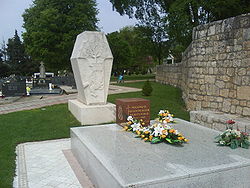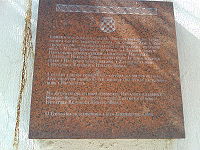- Mate Boban
-
Mate Boban 4th President of the
Croatian Democratic Union of Bosnia and HerzegovinaIn office
March 1992[1] – 10 July 1994Preceded by Milenko Brkić (acting) Succeeded by Krešimir Zubak 1st President of the
Croatian Republic of Herzeg-BosniaIn office
28 August 1993 – 19 November 1993Preceded by Office established Succeeded by Krešimir Zubak 1st President of the
Croatian Union of Herzeg-BosniaIn office
18 November 1991 – 28 August 1993Preceded by Office established Succeeded by Office abolished Personal details Born 12 February 1940
Sovići, Grude, Kingdom of YugoslaviaDied 7 July 1997 (aged 57)
Sovići, Grude, Bosnia and HerzegovinaResting place Gorica, Grude, Bosnia and Herzegovina Political party Croatian Democratic Union of Bosnia and Herzegovina Other political
affiliationsLeague of Communists of Yugoslavia (1958-1991)
Herzegovinian Democratic Union (1991)Profession Politician Religion Roman Catholic Mate Boban (12 February 1940 − 7 July 1997) was a Bosnian Croat politician and the only president of the short lived and self proclaimed Croatian Republic of Herzeg-Bosnia that existed between 1991−1994 during the Bosnian war.
Contents
Pre-war life
Mata Boban was born on 12 February 1940 in a large family in Sovići in the Municipality of Grude in Herzegovina. He finished elementary school in Sovići and later he attended seminary in Sinj and gymnasium in Đakovo. In 1958 right after he became an adult, Boban joined League of Communists of Yugoslavia[2] and after that he attended Higher College of Economics in Zagreb where he became a master of science. He was retiring and unambitious, and his students remember that he always emphasized the Communist Party badge on his suit.[3] After shorter work in Grude, he employed in Imotski in 1966 where he was leader of trading company "Napredak", which becomes very successful under his leadership.[2]
In 1980 he was jailed in Split because of economic frauds, even though he claimed during 1990s that he was imprisoned because of his nationalism and political ineligibility.[2] His political associates also lied that he was imprisoned because of nationalism, more correctly because he visited grave of Ante Pavelić in Madrid.[4] At the end of 1980s he was director of Tobacco Factory Zagreb.[2]
War in Bosnia and Herzegovina
The grave of Mate Boban in Gorica Main articles: War in Bosnia and Herzegovina, Croatian Republic of Herzeg-Bosnia, and Graz agreement
Main articles: War in Bosnia and Herzegovina, Croatian Republic of Herzeg-Bosnia, and Graz agreementThe most loyal Boban's associates were also former Communist Party members. Vladimir Šoljić was party secretary in Široki Brijeg, Valentin Ćorić in Čitluk, Pero Marković in Čapljina, Branko Kvesić was investigative judge in Mostar who was known for imprisoning kids for singing Ustaše songs, Bruno Stojić was also member of the Communist Party, while Jadranko Prlić was vice-president of the last communist government.[4]
On November 12, 1991, Mate Boban and Dario Kordić held the Joint Meeting of the Crisis Staffs of Herzegovina and Travnik Regional Communities. The two communities decided that Croats in Bosnia and Herzegovina should institute a policy to bring about "our age-old dream, a common Croatian State" and should call for a proclamation of a Croatian banovina in Bosnia and Herzegovina as the "initial phase leading towards the final solution of the Croation question and the creation of sovereign Croatia within its ethnic and historical borders".[5]
On November 18, 1991, Boban proclaimed the existence of the Croatian Community of Herzeg-Bosnia, as a separate "political, cultural, economic and territorial whole", on the territory of Bosnia and Herzegovina. This was in line with Karađorđevo agreement between Croatian president Franjo Tuđman and Serbian president Slobodan Milošević (then of Yugoslavia) to divide Bosnia and Herzegovina between Croatia and Serbia. [6]
Boban met with Bosnian Serb president Radovan Karadžić during May 1992 in Graz, Austria where they agreed on mutual cooperation in the division of Bosnia and Herzegovina that became known as the Graz agreement (the pair met again on September 2, 1993 in Montenegro in order to coordinate their actions after the Bosniaks rejected the Vance-Owen peace plan). Boban said "the Serbs are our brothers in Christ, but the Muslims are nothing to us, apart from the fact that for hundreds of years they raped our mothers and sisters."[7]
The deal called for the Serbs to aid the Croats in defeating the Bosniaks and carving a piece of Bosnia and Herzegovina and incorporating it into Croatia. Tensions mounted from June 1992 until early 1993. After many provocations and hostile acts by Croats,[5] open warfare broke out in April 1993 between Croats and Bosniaks. The Croat militia, the HVO, attacked and expelled Bosniaks all over central and southern Bosnia and Herzegovina, all the while they committed many atrocities against civilians. Examples of this include the massacres in Stupni Do and Ahmići. By early 1994 the tide was turning against the Croats. he US forced a peace treaty, known as the Washington Accords, which was signed in March 1994. Subsequently Pope John Paul II and the US government forced the ouster of Boban.[8]
Boban ordered the assassination of Bosnian-Herzegovinian Croats who opposed his plans.[1] The most well known were Stjepan Kljuić, Blaž Kraljević and Tomislav Dretar. Kraljević was lured to a meeting on August 9, 1992 and was assassinated along with eight of his deputies. Dretar survived assassination attempts but was isolated in the Bihać enclave throughout the war and as such could not oppose Boban effectively. Stjepan Kljuić remained opposed to Boban for the duration of the war.
Post war life and death
After the Washington accords ended Herzeg-Bosnia Boban went into retirement. On July 4, 1997 he had a stroke and died three days later at a hospital in Mostar. His funeral attracted no foreign dignitaries, but did attract many like minded Croats such as Gojko Šušak. There are persistent but unproven rumors that his death was faked to avoid being tried for war crimes.[9] A street in downtown Grude was named after him. Memorial plaque in his honor and Herzeg Bosnia was placed also in the same street in Grude.
A street named after him are also Kupres,[10] [11] Čapljina,[12][13] Livno,[14][15] Posušje, Ljubuški and some other places with Croatian ethnic majority.
References
- ^ Klip, André; Sluiter, Göran (2001). Annotated leading cases of international criminal tribunals. Hart Publishing. p. 348. ISBN 90-5095-375-1.
- ^ a b c d AIM press.ch Smrt Mate Bobana
- ^ Mate Boban. Retrieved 2011-09-10
- ^ a b Jergović, Miljenko. Mate Boban 1940-1997: Karadzic's 'brother in Christ'. Retrieved 2011-09-10
- ^ a b "ICTY: Kordić and Čerkez verdict". http://www.icty.org/x/cases/kordic_cerkez/tjug/en/kor-tj010226e.pdf.
- ^ "ICTY: Naletilić and Martinović verdict - A. Historical background". http://www.icty.org/x/cases/naletilic_martinovic/tjug/en/nal-tj030331-e.pdf.
- ^ Ramet, Sabrina P.; The three Yugoslavias: state-building and legitimation, 1918-2005; Indiana University Press, 2006 ISBN 0-25334-656-8
- ^ "US Behind Sacking Of Top Bosnian Croats" (HTML). IWPR. 2006-09-15. http://iwpr.net/?p=tri&s=f&o=323892&apc_state=henptri. Retrieved 2006-11-15.
- ^ "Bosnia war: Main players" (HTML). BBC News. 2000-10-14. http://news.bbc.co.uk/1/hi/world/europe/969131.stm. Retrieved 2006-05-23.
- ^ http://www.kupresportal.com/?a=v&id=1238589032&m=%C4%8Ci%C5%A1%C4%87enje%20gradskih%20ulica%20povodom%20obilje%C5%BEavanja%20travanjskih%20dana
- ^ http://www.bgs.ba/adresar.html
- ^ http://www.cob.net.ba/prepaid.html
- ^ http://www.dernek.ba/lokacija/hennessy/7630
- ^ http://www.itcomputers.ba/lokacije.php
- ^ http://www.zzozzh.com/adresar.htm
Categories:- 1940 births
- 1997 deaths
- People from Grude
- Croats of Bosnia and Herzegovina
- People of the Bosnian War
- Politicians of the Croatian Republic of Herceg-Bosna
- Croatian Democratic Union of Bosnia and Herzegovina politicians
- Bosnia and Herzegovina communists
- Deaths from stroke
Wikimedia Foundation. 2010.



